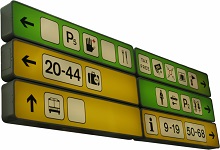Tokyo Olympic Success from a Translation and Interpretation Standpoint
May 2, 2016

Japan beat out Spain and Turkey with its winning bid to host the 2020 Olympic Games. Omotenashi, which some see as a uniquely Japanese brand of hospitality, has been used during the bid, positioning this signature Japanese hospitality as a major selling point.
In today's entry we will consider some of the ways that this spirit of hospitality can manifest itself in terms of translation and interpretation in order to contribute to the success of the games.
Making Transportation Easier to Understand
Anyone who travels outside of their own country must rely on directions and signage to travel from one point to another in an unfamiliar place. When visitors from overseas visit Japan for the 2020 Olympics, they will necessarily have to use public transportation, and therefore directions and signage should be as clear and easy to understand as possible. The Ministry of Internal Affairs and Communications is currently working on creating a plan meant to mitigate various language barriers.
While much of Japan's existing signage might look like it includes English at first glance, it's often not English--most of these signs in fact only show Romanized spellings of Japanese place names. Changing these to actual English translations instead would serve to better accommodate English-speaking visitors.
Including multilingual translations on transit signage and information displays at public institutions is a good start but won't be enough. There are plans to get the ticket machines at stations and announcements for schedule information translated into different languages as well. Other technological fixes are being considered in many arenas, such as LCD translation displays installed in taxis and translation-ready cash registers at supermarkets.
One of the most attention-worthy plans in the works for creating more foreign-language infrastructure is the development of automated translation apps for smartphones. These apps are set to become comprehensive solutions that can be catered to individual needs in overcoming language barriers.
Accommodating Diverse Dietary Needs
What to eat is one of the most essential questions when traveling. While traveling can be the chance to try foods you would never normally have access to, it can pose religious or health issues for some. This is another reason why translation and interpretation are important for travelers in Japan.
For an example, we can look at the increasing numbers of visitors from Southeast Asia, many coming from Islamic countries such as Indonesia and Malaysia in recent years. It's predicted that many more people from these countries will be visiting Japan for the 2020 Olympics. Islam, as practiced in those countries, usually involves certain dietary restrictions (halal), including prohibitions against pork and alcohol, for example. Shops in Japan need translations of information for foods that are permissible for Muslims to eat. At the same time, they need to be able to provide translations for their menus and ingredients as well. Systems like smartphone apps that automatically translate the photographed words are being considered for use with dining menus, etc.
However, the level of performance in automatic translation that would be expected to make such an effort worthwhile across a broad range of languages may prove hard to achieve in reality. Correct and complete translations into the most common languages need to be displayed in dining establishments and similar places of business.
Creating a System that Makes Medical Treatment Easier for Visitors
You may get sick when you're traveling abroad, adjusting to an unfamiliar climate and food. It is also true that, for many people who don't know the local language, it can be difficult to go to the doctor's if they are feeling under the weather. So preparing medical systems that can support foreigners who can't speak Japanese is crucial for Japan as a country that prides itself on its hospitality.
The language required for medical treatment differs in many respects from the language used in normal tourism scenarios. The many words tend to be more specialized and therefore more difficult. Not to mention, in some cases, the visitor's very life can depend on clear communication. There is the possibility that appropriate communication cannot be established with the patient depending on his/her condition or the medical facility. Japan has a plan to address such crucial issues issue by launching systems that can support multilingual communication involving specialized vocabulary like terms for symptoms and conditions.
Summary
The 2020 Olympics will be the fourth time that the games have been held in Japan. Many are vocally anticipating economic benefits that they expect the Olympic Games to bring, but for now the most important thing is to treat visitors from various countries with signature Japanese hospitality: omotenashi. Transportation, dining and medical treatment are the most essential needs of everyday life. In order to help visitors from outside of Japan have smoother access to these fundamental parts of daily life, it would be necessary to further support the linguistic side of things.
Related Services
| << The Key to Global Business: Arabic, the Third Most Widely Used Language in the World | A Must-Read for Business People! Learn correct English quickly with Interpreter Training >> |
To Contact Us Regarding Our Translation Services
For urgent needs, call:
+81-3-5730-6133
